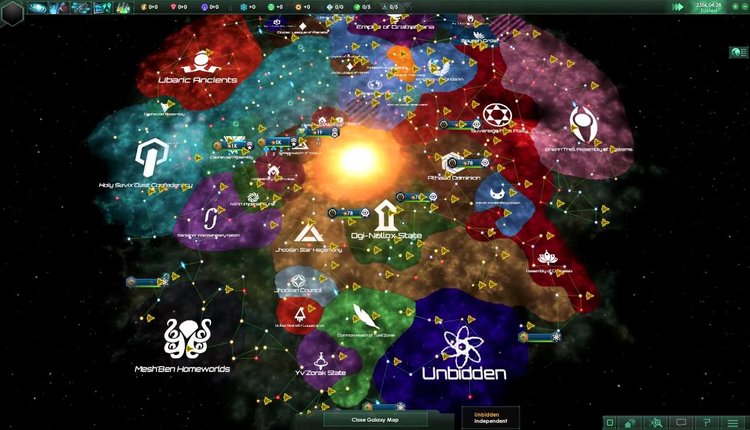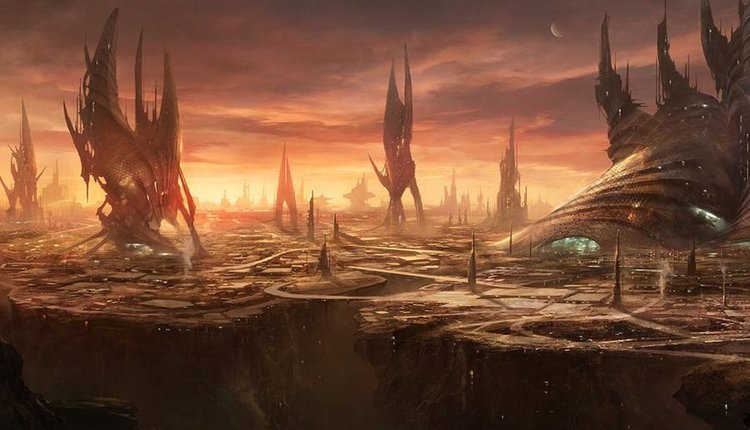Emergent Storytelling on a Galactic Scale in Stellaris
Video games have a rather unique position in the field of storytelling, largely because any good game relies on player agency for the story to unfold. Sure, Mario needs to save Peach from Bowser, but if the player doesn’t move Mario then he’s not going anywhere.
Notably, this opens the door for a form of storytelling that you can’t really get in any other mainstream media, the art of emergent storytelling. Emergent storytelling, for the purpose of this article, refers to narratives and stories that, instead of being an intentional scripted effort, rather arise from the viewer’s interpretation of unscripted and spontaneous events that take place within the game.

For the purposes of examining this, I’ll use my recent playthrough of Stellaris, a complex 4X game centred around controlling a galactic civilisation. Like most other 4X games, there is no overarching story in Stellaris, indeed most of the NPC (non-player character) civilisations are randomly generated, in addition to the map. As such, there’s not much room for scripted narratives in Stellaris.
When I started my first Stellaris run, I was dumped, with the entirety of the human race, in our solar system, with little more than a couple of ships and a goal to expand across the galaxy. And so expand we did, moving beyond our solar system, harvesting minerals from moons and meteors, power from stars and even colonising new planets. During this time, humanity also encountered other burgeoning galactic powers, some friendly, some hostile and many ambivalent.
That’s when I met Gorothi.
Gorothi was a hive mind, one consciousness spread out across an entire space-faring species concerned solely with it’s own expansion and survival. In Stellaris terms, hive minds are only one tier above genocidal robot empires and fanatical xenophobes in terms of fruitful relationships, basically retaining patience until an enemy empire gets too close to their territory, at which point they declare war and literally devour the opposition.
Luckily, being fairly distant from Gorothi’s borders, humanity was spared Gorothi’s ire, and even managed to enter into a few tentative deals for resources and research. During this time, relations with a neighbouring empire of imperialists became strained, and as my sensors picked fleet movements worryingly close to our borders, I knew I needed allies.
Unfortunately, as we contacted one civilisation after another, each was unwilling to enter into a defensive agreement with us, citing either pacifism or simply not liking us. As my rival readied their fleets at the borders, in desperation I turned to Gorothi, and was surprised when the powerful Hive Mind agreed to a mutual defensive pact.
[perfectpullquote align=”full” bordertop=”false” cite=”” link=”” color=”#70006C” class=”” size=”19"]”Though humanity itself managed to develop good relations with most of galaxy, many feared and hated Gorothi.”[/[/perfectpullquote]p>
Needless to say, when the imperialist regime finally launched it’s assault, it was ill-prepared for the resulting two-front counter attack, and not too long after, Gorothi and I had successful divided up most of my former rival’s territory between each other.
After our victory over the imperialists, the bond between humanity and Gorothi only got stronger, though this came at the cost of our relations with other empires. Though humanity itself managed to develop good relations with most of galaxy, many feared and hated Gorothi. When several of the other empires banded together to form a federation, I was tempted to join, but when it became clear that by joining the federation, I would have to sacrifice the diplomatic deals I had made with Gorothi, I hesitated.
My decision was made when the natives of a small planet within Gorothi’s borders came to me, begging that I take their world into my empire to protect them from Gorothi, who had enslaved them. As reluctant as I was to do anything to upset Gorothi, humanity couldn’t ignore a plea for help, so I accepted their request and readied myself to run to the Federation for protection against my once ally.
For all my fears however, it turned out Gorothi didn’t mind. Checking my contacts tab I noticed that while our relationship did take a substantial hit, more than enough to enrage most empires, Gorothi’s relationship with humanity was so positive that this hit didn’t even make it less friendly to us, even as our new world directly encroached into the same territory the Hive Mind aggressively protected from all others.
Struck by the depths of Gorothi’s loyalty to the human race, I knew I couldn’t abandon my friend to a Federation that hated and feared it. When the Federation came for Gorothi, humanity stood with it, driving Federation ships back time and again, sometimes losing territory, sometimes gaining it.
It was just after one of these bouts with the Federation that humanity’s sensors started picking up strange readings from a system within the Federation. Shortly after, these same readings reported that multiple unknown fleets had seemingly materialised within the system out of a rift in the universe.
They called themselves the Unbidden, and our few attempts to make contact with them made it clear that they were not interested in diplomacy, something that became all the more apparent as they spread and proceeded to literally rip the life from habited worlds and reduce them to barren husks. Fortunately for us and unfortunately for the Federation, the Unbidden had appeared in their territory, so while the Federation fought a war on multiple sides, losing planets by the week, humanity was able to prepare for the Unbidden.
After upgrading and building our navy as best as we could, we set out to engage the Unbidden before they rendered most of the galaxy uninhabitable. Despite most of their fleets being occupied with the Federation, this was no simple task, as the same portal that brought the Unbidden to our universe continued to spit out reinforcements. Worse yet, in some of the systems they conquered, the Unbidden set up ‘dimensional anchors’, which needed to be destroyed before the portal would be vulnerable.
Destroying the anchors was simple enough, as the Unbidden were, as mentioned, tied up with the Federation’s forces, though our fleet did lose a few ships in the meantime. When I neared the system containing the portal however, the true extent of what I was facing became apparent. The system only contained one Unbidden fleet protecting the portal, but said fleet was fair beyond anything my strongest fleet could handle on it’s own. My one window to stop the Unbidden had closed.
That’s when Gorothi came to our rescue one last time. Just as I was giving the order to fall back, sensors picked up an immense Gorothi fleet entering the Unbidden’s system. Seeing the opportunity, I immediately ordered my fleet to follow suit. As the fleet entered the system, Gorothi was engaged in a tense battle with the Unbidden fleet, its’ advanced weaponry tearing through Gorothi’s fleet.

However, what Gorothi lacked in technology, it compensated with numbers. With the sheer weight of Gorothi’s ships keeping the Unbidden fleet busy, humanity got the one chance it needed to attack the portal head on. With no protectors, the portal fell quickly, and now dealing with two fleets, so too did the Unbidden’s greatest fleet.
I could go on to explain what happened in the game after that, but ultimately, I don’t think the fairly uneventful end is that important. The main point of this story, I believe anyway, was that the events I described, of an initially small empire managing to achieve success against all odds due to it’s friendship with a vast, but horribly maligned Hive Mind, was a story as interesting as any other you’d find in a sci-fi game.
The main difference was that nothing, save the arrival of the Unbidden, was scripted by the game, instead organically arising from the actions of the multiple actors, both player and NPC, within the game. And that, in my opinion at least, is one of the truly unique aspects of games that validates them as an art form, that they can allow the player to create their own narrative out of what arises naturally in the game.
While this is far from the only way games contribute to meaningful art and entertainment, emergent storytelling is something games offer that no other art form does and, in its own way, can claim to offer players an experience that is truly unique to them.

